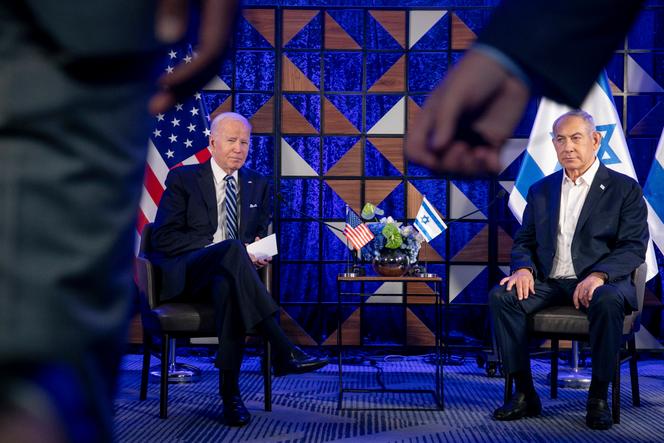


Between a shortened visit, with no meetings with Arab leaders, and empathetic gestures to the Israeli victims of the Hammas attack, US President Joe Biden's high-stakes visit to Tel Aviv on Wednesday, October 18, the first by an American president to wartime Israel, was not measured in gains. This was true even though the US Democrat got the green light from Egypt for the – symbolic – entry of 20 humanitarian aid trucks through the south of the Gaza Strip.
His visit also marked the scale of the US' forced return to the Middle East, from which it had mistakenly believed it could turn away for the sake of other priorities. It was a show of personal and state loyalty to the security of an ally. But it came at the price of diplomatic isolation for the US, as demonstrators in Beirut, Amman and Istanbul on Wednesday denounced the deadly explosion at Gaza's Al-Ahli Arab Hospital the previous day.
From the moment he arrived, Biden reiterated Israel's line about the hospital strike. The Jewish State denied having hit the hospital and blamed a faulty Islamic Jihad rocket. Aware that the Israeli army's systematic denials in such cases have undermined its credibility, he later clarified that he had obtained this information from the US Defense Department.
Biden, in typical style, was affectionate to his Israeli counterpart in public before speaking more brutally behind closed doors. He listened to families of victims and hostages, as well as survivors of the attack, who hold their own government responsible for the tragedy, and who are grateful to the US president for his concern. Biden later empathized with the mourning felt by the Israelis, "the perfume when you open the closet door, the morning coffee you used to share." But Biden also sought to set implicit limits on US support for Israel. Without calling for a ceasefire, he made the humanitarian emergency in Gaza the priority of his trip. Hence his satisfaction at having reached a compromise, by telephone, with the Egyptian President Abdel Fattah El-Sissi.
Twenty aid trucks, authorized by Israel to transport water, food and medicines, are due to pass from Egypt to Gaza via the Rafah border in the coming days. It's a drop in the bucket compared with Gaza's needs, but it took a lot of pressure from Biden to get Israeli Prime Minister Benjamin Netanyahu to accept the aid, despite demands for severity and "cruelty" from his embattled Likud party and its far-right allies.
Since the start of the war, for Israel, the very principle of humanitarian aid to Gaza was conditional on Hamas releasing its hostages. It's a testament to the influence of the far right, not only on public opinion traumatized by the attack by Hamas, but also on the choices made by the government, even though Netanyahu has taken care to exclude extremist ministers from the conduct of operations by excluding them from the war cabinet.
You have 58.97% of this article left to read. The rest is for subscribers only.
